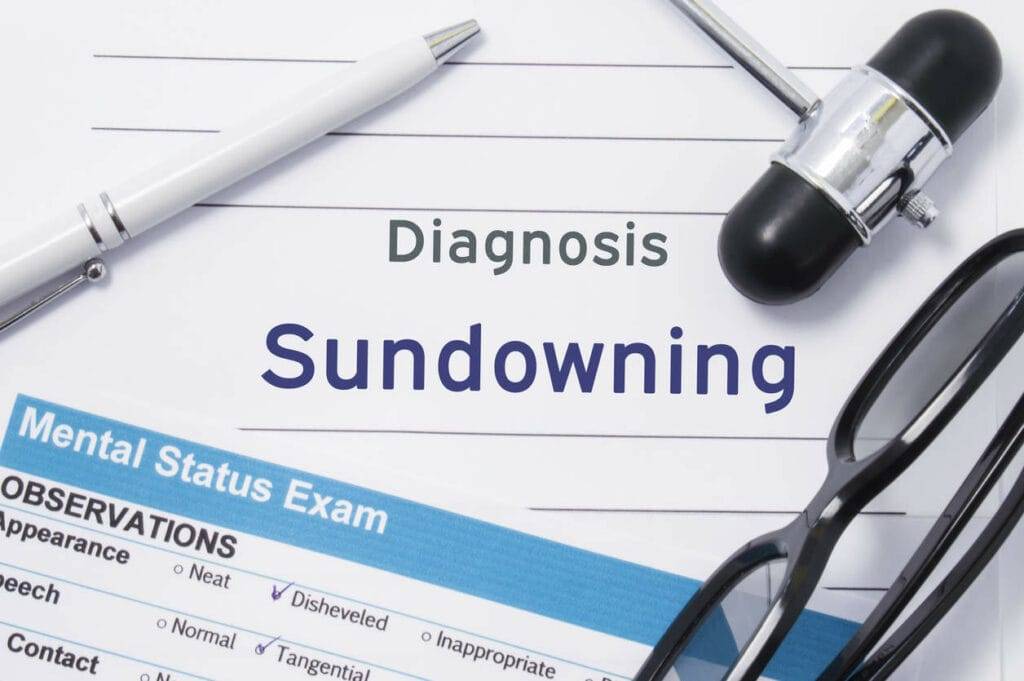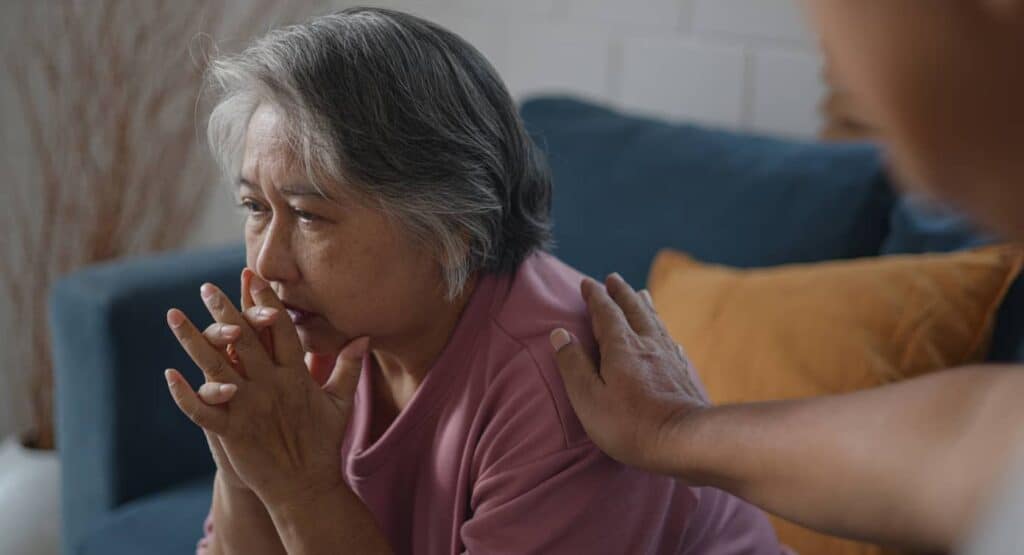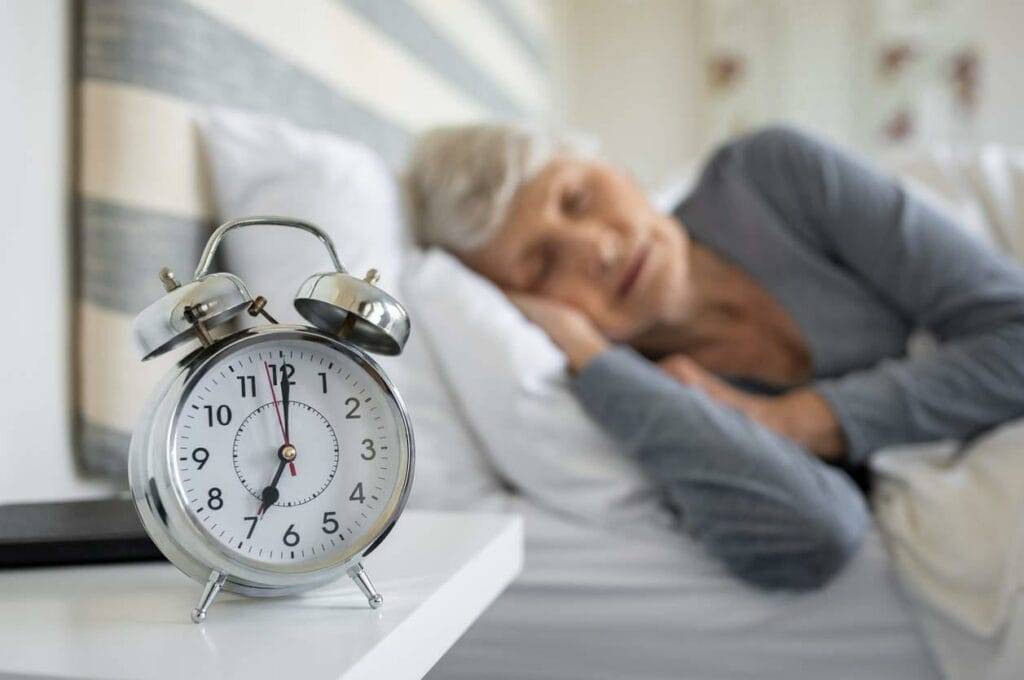Family Survey
Family Survey Please share your honest feedback to help us improve the care and safety of your loved one.
As the sun begins to set, a strange thing often occurs in the world of senior care, especially dementia care. It’s called “sundowning,” and it can make the evenings quite challenging for both, the elderly and their caregivers. But when exactly should we start worrying about sundowning?
In this article, we’ll discuss various stages of dementia to see when sundowning becomes a real concern. Whether you’re a caregiver, a family member, or simply interested in understanding sundowning syndrome, keep reading to navigate this important aspect of caregiving.

Sundowning Syndrome refers to a particular pattern of behavior that mostly affects older adults, mainly those suffering from Alzheimer’s disease or other forms of dementia. It is characterized by confusion, agitation, and restlessness that worsen during the late afternoon and evening hours. As the name indicates, it typically starts as the sun begins to go down or set and is also known as ‘late day confusion’.
Sundowning is not classified as a specific medical condition but rather as an umbrella term that describes symptoms associated with dementia, especially Alzheimer’s disease. Medical professionals often refer to it as “sundown syndrome” or “sundowning behavior.” While it’s not a definitive diagnosis, recognizing these symptoms is crucial for providing appropriate care and support to affected seniors.

Sundowning can be perplexing and distressing for both seniors experiencing it and their caregivers. It may present in a range of behavioral changes, which include confusion, anxiety, mood swings, restlessness, and even physical aggression. These symptoms often become more apparent as the day progresses, especially in the late afternoon and evening, and may fade away during the night.
The impact of sundowning on seniors is quite significant. It disrupts their daily routines, leading to sleep disturbances, and can result in exhaustion and increased dependence on caregivers. These behavioral changes are also distressing for family members who may not fully understand the reasons behind these unusual shifts in their loved one’s behavior.
It’s essential to differentiate sundowning from other related conditions that may affect older people, as this would influence treatment strategies and care approaches. Some of the conditions that may share symptoms with sundown syndrome include:

Caregivers can plan better and manage the challenges of any disease in the elderly when they understand its common signs, symptoms, and contributing factors. But what signs make it more crucial for caregivers to monitor changes in seniors with sundowning? Let’s find out.
One of the hallmark symptoms of sundowning is an increase in confusion and disorientation during the late afternoon and early evening hours. Seniors with sundowning may suddenly become unaware of their surroundings, not recognizing familiar places, even within their own homes. This heightened confusion can lead to anxiety and fear, requiring caregivers to be vigilant and provide reassurance.
Sundowning often brings about a sense of restlessness and agitation. Your loved one may become restless, unable to sit still, and may constantly change positions. This uneasiness becomes distressing for both the seniors and their caregivers. Engaging them in calming activities or creating a soothing environment may help manage it.
Some seniors with sundowning may suffer from hallucinations, which are vivid sensory imaginations of things that are not there. These hallucinations are particularly challenging for caregivers to handle as the seniors believe them to be real. Sundowning can also trigger paranoia in the elderly, causing them to become suspicious or fearful of others around them. Caregivers need to approach such situations with patience and empathy, as their support and comfort can go a long way in easing these distressing times.
Sundowning also results in significant mood swings, with seniors rapidly cycling through different emotional states. They may go from calm to irritable, sad, or anxious within a short time. Caregivers should be prepared for these mood fluctuations. They should know the useful strategies to help mitigate their impact on the seniors’ well-being.
Many factors contribute to the severity of sundowners syndrome. Let’s discuss each of these factors to get a better understanding of how they affect the severity of sundowning behavior.

Biological factors play a crucial role in the severity of sundowning. These factors are related to changes occurring within the elderly’s body.
Sundowning is often associated with changes in the brain, particularly in seniors with Alzheimer’s disease. As the disease progresses, brain regions responsible for regulating mood, sleep, and behavior undergo degenerative changes. These changes affect the seniors’s ability to deal with the outside environment, leading to increased vulnerability to sundowning episodes.
The body’s internal clock, known as the circadian rhythm, regulates the sleep-wake cycle and various physiological processes. Disturbance in this rhythm leads to confusion and agitation, especially during the evening hours. External factors, such as insufficient exposure to natural light during the day, worsen these disturbances.
Elderly with dementia may experience sensory overload, where they feel overwhelmed by external sensory stimuli such as noise, light, or unfamiliar and distracting surroundings. This overload contributes to the severity of sundowning, as their ability to process and filter sensory information diminishes.
Fatigue significantly impacts the intensity of sundowning episodes. As the day progresses, seniors with dementia may become physically and mentally tired. It makes it harder for them to manage their emotions and behaviors. This exhaustion can aggravate the symptoms of sundown behavior.
Seniors with dementia often experience broken sleep patterns or insomnia. Poor sleep quality can worsen the sundowning symptoms, as it contributes to overall irritability and cognitive impairment.
Older adults are at a higher risk of dehydration due to less awareness of thirst and difficulty in communicating their needs. Dehydration leads to physical discomfort and confusion, both of which can make sundowning behaviors more severe.
Environmental factors can significantly influence the occurrence and severity of sundowning.
Inadequate lighting and excessive noise contribute to the severity of the symptoms. Poor lighting causes disorientation and increases the likelihood of falls or accidents, while loud noises agitate and distress the elderly. Create a calm and well-lit environment to help reduce the severity of sundowning episodes in them.
Changes in the physical environment, such as rearranging furniture or introducing unfamiliar objects, often trigger confusion and agitation in seniors with dementia. Maintaining a consistent and familiar living space minimizes confusion and agitation.
Transitions or changes in the environment, such as moving to an assisted living, can aggravate sundowning symptoms in the elderly. Those with dementia often find comfort in familiarity, so disruptions to their living situation can exacerbate their condition.

Some other factors that play a significant role in increasing the severity of sundowning syndrome include:
Some medications prescribed for seniors with dementia may have side effects that contribute to sundowning symptoms. Since older people are usually on a list of medications, It’s essential for caregivers and the healthcare team to monitor the effects of drugs and any possible drug interactions in the elderly. Then, they would adjust prescriptions as needed to minimize these adverse reactions.
People with dementia often have coexisting health conditions. Conditions such as pain, infections, or metabolic disturbances can increase agitation and confusion, It may lead to sundown behavior, making it crucial to address these underlying health issues.
The approach taken by caregivers can have a profound impact on the severity of sundowning episodes. Caregivers who provide a calm, reassuring, and empathetic presence help lessen the severity of sundowning. Communication techniques that focus on validation and redirection, rather than confrontation, are particularly effective in minimizing challenging behaviors.
Research shows that the prevalence of sundowning in seniors with dementia, especially Alzheimer’s is up to 66%. However, symptoms of sundowning vary in different stages of dementia. In early dementia, it’s not quite obvious but with the progression of dementia, sundowning also worsens.
You need to adopt a comprehensive approach to effectively manage sundowning. Caregivers, whether they are family members or hired, can play an impactful role in using management strategies to improve the overall well-being of their senior loved ones.

Seniors tend to feel more secure and less anxious when they have a clear routine. Set consistent times for their meals, naps, and bedtime to provide them with a sense of stability.
Create a calming environment. As the evening approaches, dim the lights, reduce noise, and declutter living spaces. This helps create a peaceful atmosphere, reducing agitation. Limiting stimulants like caffeine and sugar, especially in the afternoon and evening, also minimizes undue restlessness and helps maintain a sense of calm.
Encourage the elderly to engage in regular physical activity. Simple exercises like a short walk or seated yoga can boost mood and improve sleep patterns. Loneliness and isolation can also worsen sundowning. Make arrangements for their visits with friends, family, or group activities to provide companionship.
Arrange fun activities to stimulate their minds. Engage seniors in activities like puzzles, memory games, or simple tasks that challenge cognitive function, promoting mental agility. Find out their interests such as painting, gardening, or playing musical instruments, and organize those activities to keep them active and engaged throughout the day.
Create a relaxing bedtime routine, and establish a calming pre-sleep ritual, such as reading a book or listening to soothing music, to signal the body that it’s time to rest.
Consult a healthcare provider to identify and manage any existing sleep disorders like sleep apnea or insomnia, which can intensify sundowning symptoms.
Regularly consult a healthcare professional to assess the necessity and effectiveness of medications. Adjust doses or explore alternative treatments if required. It’s important to communicate your concerns about sundowning to a healthcare professional who can offer expert guidance and create a tailored care plan.
Keep a close watch on the impact of medications and check with your healthcare team to ensure they are optimized for the best results. Besides medication, there are many non-drug approaches like light therapy, aromatherapy, or relaxation techniques to alleviate sundowning symptoms.
Recognize that sundowning behaviors are not deliberate actions; they stem from cognitive changes. Approach your loved one with patience and understanding. Use clear and simple communication to minimize confusion and frustration. Offer reassurance and comfort when needed.
Keep a detailed record of sundowning episodes, including triggers and responses. Share this information with the healthcare team to refine and improve care strategies.
By adopting these holistic strategies and involving caregivers in a proactive and empathetic manner, managing sundowning in seniors can become a more manageable and less distressing aspect of caregiving.
Sundowning impacts not only the elderly but also their caregivers. Let’s look into some difficulties faced by caregivers and the vital role of self-care in maintaining caregivers’ health.


Remember, caring for individuals with sundowning dementia requires you to show unwavering compassion, patience, and adaptability. You need to understand that every individual’s experience with sundowning is unique. The key is to approach each situation with a willingness to adapt your management plan to their specific needs.

If you or someone you know is in need of assistance and care for a loved one with sundowning, reach out to Amy’s Eden. Our dedicated team specializes in providing a nurturing and supportive environment for your loved ones living with sundowning.
Contact us today to learn more about the personalized care and services we offer to help your loved one thrive in a safe and compassionate home-like setting.
Get care >
Family Survey Please share your honest feedback to help us improve the care and safety of your loved one.
Professional Senior In-Home Care in Carson City Keep your loved one in the comfort of their cherished home. Amy’s Eden delivers exceptional senior care services

The Best Home Care in Reno, NV The comfort of your home, the quality of Eden. We provide compassionate, professional in-home care services for seniors
A Real Home for Assisted Living in Carson City, NV Give your loved one the exceptional, personalized care they deserve. Our senior care homes in
